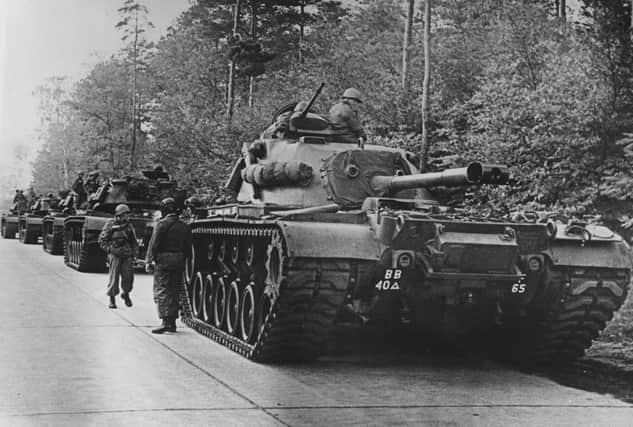When did the Cold War end? Start and end dates of US and Soviet Union rivalry after WW2 - outcomes explained
This article contains affiliate links. We may earn a small commission on items purchased through this article, but that does not affect our editorial judgement.


With images of missile strikes and tanks rolling in, many have been reminded of major conflicts, including The Cold War.
Advertisement
Hide AdAdvertisement
Hide AdBut what where the key dates of the conflict and what was the outcome?
Here’s everything you need to know about The Cold War.
What was The Cold War?
The Cold War was a period of geopolitical tension which saw the United States and the Soviet Union face off.
The allies of the United States (the Western Bloc) and allies of the Soviet Union (the Eastern Bloc) also faced off during this time.
It is named the ‘Cold War’ because the US and Soviet Union never officially declared war on each other during the period of conflict.
When did the Cold War begin?
Advertisement
Hide AdAdvertisement
Hide AdThe beginning and starting points are often debated by historians, due to the fact that war was never officially declared and there was no direct fighting between the two countries.
However, it is generally recognised that the Cold War began in the aftermath of World War Two on 12 March 1947.
This date was when the Truman Doctrine was invoked, a piece of US foreign policy which sought to contain the geopolitical power of the Soviet Union.
When did the Cold War end?
Although a date is not believed to be concrete, the most widely-agreed finishing point is 26 December 1991.
It was on this date that the Soviet union was dissolved.
What were the key moments of the Cold War?
Advertisement
Hide AdAdvertisement
Hide AdFor a period of tension which lasted more than 40 years, there were many flashpoints.
While there were strategic back and forths between the West and the communist Eastern Bloc, there were power struggles also.
This includes Soviet Union invading more land, such as Hungary in 1956.
Both the US and the Soviet Union faced off in a space race from 1955 until 1972 in a show of power for both sides.
Advertisement
Hide AdAdvertisement
Hide AdHowever, eventually the USSR regime was toppled, with a major point coming in the fall of the Berlin War in 1989.
West Germany lived under a capitalist society, while East Germany lived under a communist society, with former US President Ronald Reagan famously saying “ Mr Gorbachev, tear down this wall.”
The fall of the wall brought together West and East Germany - which was separated by a concrete wall through its capital city - for the first time since since 1961.
What were the outcomes of the Cold War?
Eventually, the Soviet Union was dissolved in 1991.
Upon the dissolution of the Soviet Union, new states emerged and re-emerged in eastern Europe.
Advertisement
Hide AdAdvertisement
Hide AdAlongside the Russian Federation, 14 countries were created in total, including:
- Armenia
- Azerbaijan
- Belarus
- Estonia
- Georgia
- Kazakhstan
- Kyrgyzstan
- Latvia
- Lithuania
- Moldova
- Tajikistan
- Turkmenistan
- Ukraine
- Uzbekistan
Despite the union being broken up, it has continued to influence Russian politics and the politics of the countries involved.
Russian President Vladimir Putin has often referred to the countries which were once part of the Soviet Union as being in Russia’s “sphere of influence”.
Prior to the invasion of Ukraine on 24 february 2022, Putin also spoke publicly about how modern Ukraine was built on “ancient Russia land”.
A message from the editor:
Advertisement
Hide AdAdvertisement
Hide AdThank you for reading. NationalWorld is a new national news brand, produced by a team of journalists, editors, video producers and designers who live and work across the UK. Find out more about who’s who in the team, and our editorial values. We want to start a community among our readers, so please follow us on Facebook, Twitter and Instagram, and keep the conversation going. You can also sign up to our email newsletters and get a curated selection of our best reads to your inbox every day.
Comment Guidelines
National World encourages reader discussion on our stories. User feedback, insights and back-and-forth exchanges add a rich layer of context to reporting. Please review our Community Guidelines before commenting.
